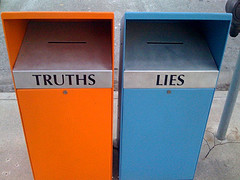Evaluating What
You Find |

|
|
Do you believe everything anyone tells you? Do you believe everything you read? Then, obviously you won't believe that everything on the Web is true, right?
|
Although the Web makes finding information easy, evaluating the information you find is often not so easy. Your professors will expect you to use the highest quality information for your academic work.
|
Here are some characteristics of high quality information and some steps you can take to find the highest quality information available.
|
| High Quality Information is: |
|
True |
We all want information that is true. If you ask someone what time it is, you want them to give you the correct time, don’t you? Of course, knowing what’s true and what’s not can get tricky. Other words that people use to describe this characteristic of information include: accurate, reliable, credible, trustworthy, and authoritative. Just as you may trust certain people more than others to give you true and accurate information, certain sources of information are more credible, and more likely to be true, than others.
|
|
Complete |
Just like courts of law, not only do we want the truth, we want the whole truth! Complete information is detailed, thorough, comprehensive, scholarly. In academic work, sometimes the details make all the difference. |
|
Easy-to-Use |
Easy-to-use information is readily available, well-written, well organized, at your level, and useful. |
|
Up-to-Date |
Up-to-date information is current. The mere fact that something is on the Internet or in electronic format is not a guarantee that it is current or regularly updated.
|
|
Not Biased |
Information that is not biased is balanced, competent, professional, serious, critical, scholarly, and authoritative. Some commercial websites may exhibit bias because they are trying to get people to buy their product; political websites often select or slant information to suit their point of view or agenda.
|
Not a Hoax |
Hoaxes are special cases of biased, untrue information. Hoaxes often fool people who are more gullible than skeptical or who have a strong desire to believe that some aspect of the hoax is true. There are many hoaxes on the public Web. |
|
|
Back
|
Next |
|